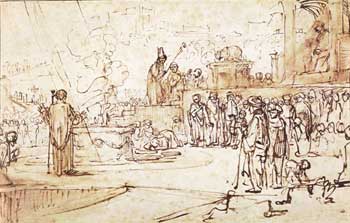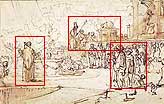
Restoring the Ruined Altar
Elijah threw down the gauntlet, and the king willingly picked it up and set things in motion, but the text notes that the people were not able to respond to Elijah's proposal. "How long will you keep vacillating between two beliefs? If the Lord is god follow Him; and if Baal, follow him! But the people answered him not a word. (I Kings 18:21).
Rashi, the medieval biblical exegete supplies the reader with an interesting insight.
But the people answered him not a word. They were unable to discern.
It was not out of malice that the people had left the fold. It was a function of ignorance and alienation. They had lost all contact with their own cultural heritage and had been swept away by the oblivion of paganism. Only Elijah's dramatic pyrotechnics could jolt them back to the fundamentals of belief.
How was this matter resolved? Fire descended from on high consuming Elijah's sacrifice and proving the supremacy of the God of Israel over Baal. The entire nation, from the king to the commoners, was brought to their knees. The resounding chorus of "The Lord alone is God, The Lord alone is God!" was proclaimed in unison. This moment is etched for posterity as an unprecedented spiritual zenith. Elijah's actions reunified the people and the king with the God they had forgotten. Yet something else happened on Mount Carmel that fateful day even before the dramatic denouement. A remarkable degree of rapprochement was achieved between Elijah and his people and between Elijah and his king.
Then Elijah said to all the people, "Come closer to me"; and all the people came closer to him. He repaired the damaged altar of the Lord. Then Elijah took twelve stones, corresponding to the number of the tribes of the sons of Jacob -- to whom the word of the Lord had come Israel shall be your name, and with the stones he built an altar in the name of the Lord. (I Kings 18:30-32)
Elijah, the daunting prophet, compassionately reached out to the people to draw them close. He actively involved them in the rebuilding of the altar of God with twelve symbolic stones. Together they restored the old altar rather than building a new one.
Rabbi Josef Kara interprets the incident as follows:
And he repaired the broken altar of God. He built an altar and reminded the people of Israel that the altar of the name of God should be in their hearts and on their lips. Since His name and presence had been broken down, cut off, shut down and forgotten from the consciousness of all twelve tribes.
The symbolic action of rejoining twelve stones of Israel was intended to educate the people that they could all return to God with one heart, one altar, one Torah. The symbolism of the twelve stones made it clear that unity of spirit can allow for blessed diversity. Elijah the zealot informed the people of Israel that as the fundamentals of faith are the unity we share we can surmount our differences. Building the altar was testimony to the strength, which inheres in unity. After so many long years of estrangement and alienation the people and their prophet joined forces. The struggle was over, the battle was won
Ahab King of Israel >>